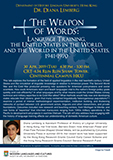
| News & Events |
| 30 April 2019 | |
Talk: Dr. Diana Lemberg 30 Apr 2019 (Tue) 4:30-5:30pm |
|
This talk explores the formation of the field of applied linguistics in the mid twentieth-century United States and the circulation of linguistic knowledge in relation to American power. The Second World War and the Cold War produced pressing new questions for American policymakers and social scientists. How could Americans learn and teach languages vital to the nation’s foreign-policy goals quickly and cost-efficiently? In what languages and by what means could the United States convey technical and military expertise to its Cold War allies? What methods would help new and developing states educate their citizens, given that many contained linguistically heterogeneous populations? I examine a period of intense methodological experimentation, institution building, and thickening networks of contact between U.S. government actors, linguists and other researchers, and private foundations. Outcomes included new research and teaching centers, from Michigan to Manila; and new forms of “expertise” that informed maneuvers ranging from 1940s military operations in the Pacific to development-aid projects in wartime Vietnam. The talk will also address how engaging with the history of language training affects our understanding of domestic American culture. Diana Lemberg is Assistant Professor of History at Lingnan University in Hong Kong. Her first book, Barriers Down: How American Power and Free-Flow Policies Shaped Global Media, will be published by Columbia University Press in summer 2019. Her recent work has been supported by the Hong Kong Research Grants Council Early Career Scheme and the Hong Kong Research Grants Council General Research Fund.
|
|
